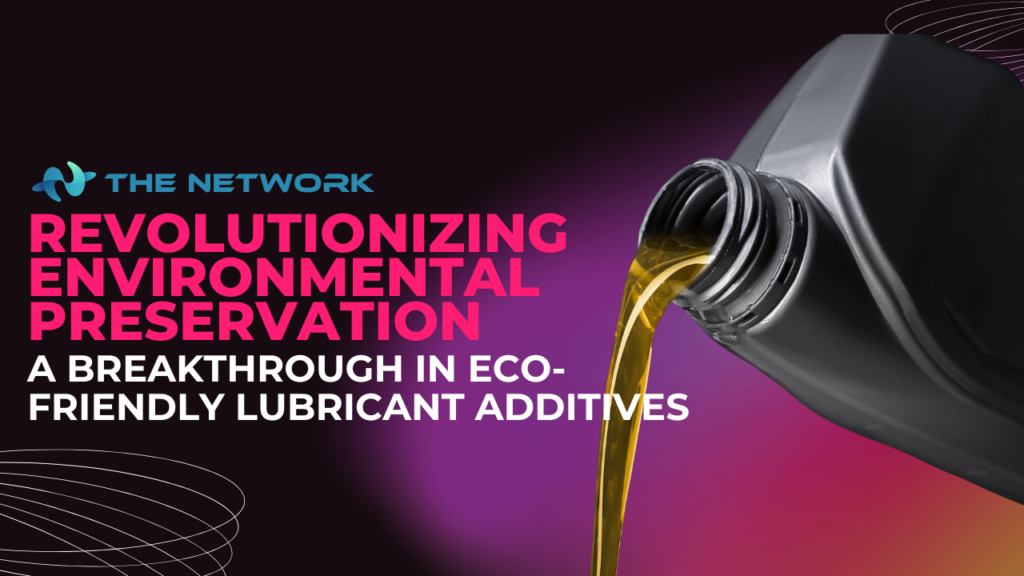Revolutionizing Environmental Preservation: A Breakthrough in Eco-Friendly Lubricant Additives

In the quest for sustainable energy solutions, scientific innovation continuously pushes boundaries. One such breakthrough lies in the synthesis of eco-friendly lubricant additives, a development with far-reaching implications for both technology and environmental preservation. This article delves into the recent advancements in lubricant additives, exploring their synthesis, benefits, and future implications.
Advancements in Lubricant Additives Technology
- Introduction of Ionic Liquids (ILs): Scientists at the Oak Ridge National Laboratory (ORNL) have harnessed the power of ionic liquids (ILs), organic liquid salts, to develop lubricant additives that exhibit superior performance and minimal environmental impact.
- Optimized Additive Composition: The research team meticulously designed ILs of ammonium phosphate and phosphonium phosphate, tailoring their properties to ensure enhanced lubrication while meeting stringent environmental standards.
- Performance Enhancement: IL-enhanced lubricants showcased a remarkable 50% reduction in friction and a tenfold decrease in equipment wear compared to conventional gear oils, demonstrating their efficacy in protecting water turbine equipment.
- Environmental Friendliness: The newly developed additives prioritize environmental sustainability, boasting non-toxicity and biodegradability, crucial factors in mitigating adverse effects on aquatic ecosystems.
- Scalability and Commercial Viability: The synthesis process of these additives is straightforward, enabling easy scalability for commercialization, thereby facilitating widespread adoption across various industries.
Advantages and Disadvantages
- Advantages: Enhanced equipment performance, reduced environmental impact, scalability for commercialization.
- Disadvantages: Potential challenges in scaling up production, initial implementation costs.
Future Implications
The implications of eco-friendly lubricant additives extend beyond environmental conservation. These advancements pave the way for:
- Improved efficiency and longevity of machinery.
- Mitigation of ecological damage caused by lubricant contamination.
- Accelerated transition towards sustainable energy solutions.
School or Homeschool Learning Ideas
- Conduct a hands-on experiment demonstrating the friction-reducing properties of different lubricants.
- Organize a field trip to a local water turbine facility to observe real-world applications of eco-friendly lubricant additives.
- Analyze case studies highlighting the environmental impact of conventional lubricants on aquatic ecosystems.
- Engage in a debate discussing the ethical considerations of prioritizing performance versus environmental sustainability in industrial practices.
- Collaborate on a research project exploring the chemistry behind lubricant synthesis and its implications for environmental science.
What Our Children Need to Know
- Children should understand the importance of sustainable practices in preserving natural resources for future generations. For example, they can learn about the impact of lubricant pollution on marine biodiversity.
- Encourage critical thinking by posing scenarios where children must evaluate the trade-offs between technological advancement and environmental conservation. For instance, discuss the ethical dilemmas faced by scientists in developing eco-friendly lubricants.
- Foster empathy towards aquatic ecosystems by illustrating the interconnectedness of all living organisms and the consequences of disrupting delicate ecological balance.
The Big Questions
- How can scientific innovation strike a balance between technological progress and environmental preservation?
- What role do policymakers play in incentivizing the adoption of eco-friendly technologies in industrial settings?
- How can individuals contribute to reducing their carbon footprint through conscious consumer choices?
- What challenges might arise in implementing widespread adoption of eco-friendly lubricants, and how can they be addressed?
- How can interdisciplinary collaboration between scientists, policymakers, and industry stakeholders drive sustainable solutions for global challenges?
Conclusion
The synthesis of eco-friendly lubricant additives marks a significant stride towards sustainable industrial practices and environmental stewardship. By harnessing the power of science and innovation, we pave the way for a greener, more resilient future.





Responses